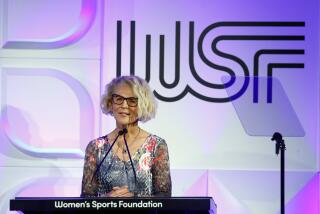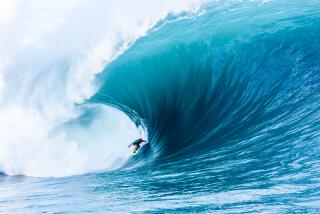Since Her First Ride in a Canoe, She Hasn’t Missed the Boat : Outrigger racing: Davis, a personal trainer in Irvine, has led her team to six world titles since taking up the sport.
- Share via
IRVINE — Leslie Davis fell in love with offshore outrigger racing the first time she got in the canoe. A former high school friend and a paddling coach she met while playing beach volleyball talked her into giving it a try. She’s spent as much time as possible with a paddle in her hands ever since.
“I was living in Hermosa Beach and I had this passion for beach volleyball,” she said. “I kept telling these guys I didn’t have the time to be paddling around in the ocean.
“But I finally gave it a try, and it was one of those afternoons you know is just a blessing from God. Orange sun. Slate-blue water. It was just so incredibly gorgeous. And there was this canoe with five very healthy guys sitting there and one empty seat for me.”
Davis was just along for the ride. But what a ride.
“I didn’t know what the heck I was doing,” she said. “I was no help at all. But it was such a wonderful feeling. The way the boat moved through the water. Being out in the ocean. By the time we got back, the hook was in deep.”
Davis, now a personal trainer at The Sports Club/Irvine, soon became more than a passenger in the canoe. She has led her six-woman team from the Newport Blue’s Offshore Canoe Club to an unprecedented six consecutive world championships in the 42-mile Molokai Channel race in Hawaii.
Along the way, however, she discovered that the sport isn’t always contested on postcard-perfect days blessed with flat water and sunshine.
“The best conditions for the Molokai race were in 1986, when we won the first time,” Davis said. “There was about a four-foot swell, with dolphins, flying fish and rainbows along the way.
“A couple of years before, though, there were 15-foot breaking waves and 25- to 30-knot winds. It was the first year we had actually been in the lead, but then we flipped. And we didn’t flip in the traditional way, when the outrigger flips over the canoe.
“We got caught sliding down a very steep swell and the outrigger buried in the wave. Then the wave just catapulted the hull over the outrigger and we went flying. When we came up, paddles were going this way and paddlers were going that way in the current and waves.”
A power boat serves as an escort for each canoe--carrying six more paddlers who alternate in the outrigger--but because life preservers restrict freedom of movement, paddlers brave the Pacific in only a bathing suit.
“It was scary. We all thought we’d die,” Davis said. “We managed to flip the canoe back and tried to bail it out, but it hit the water so hard, the hull had cracked.”
The team members scrambled aboard the escort boat and the outrigger was taken in tow. Then they all watched in horror as the $25,000 boat--made of precious koa wood and borrowed from a Hawaiian team--started breaking up.
“The seas were so rough and we had to go so slow that it took us six hours to reach the nearest land,” she said. “We were all throwing up and going looney by the time we got there. We all vowed to never paddle the channel again.”
They did, of course, and Davis wears a memoir of a much more pleasant six-hour trip on her left wrist, a bracelet with her name in Hawaiian and “5 hours, 44 minutes, 13 seconds” engraved on the inside. It’s the Offshore Canoe Club’s world-record time set in 1990.
Davis, who has paddled in all 11 women’s competitions in the Molokai to Oahu race, has been instrumental in the evolution of outrigger competitions for women. Currently, she is president of the 85-member Offshore Canoe Club and, as president of the California Outrigger Assn. for four years, she spearheaded the drive to include women’s races--at the same distances as the men.
“Women were always relegated to second-class status and there were no distance races at all for women. Halfway through some of these races, I guess some women probably hate me for that now,” she said, laughing.
Clearly, this sport has come a long way.
“When I first started, it used to be a get-your-friends-out-of-the-bar-and-paddle-and-then-go-back-to-the-bar sport,” she said. “It was very recreational. Now, you’ve got world-class athletes from all over the world participating. We have two Olympic gold-medalist kayakers from Sweden who have raced on our world champion teams.”
Paddling requires more than brute, upper-body strength, though. It’s also a sport of finesse and technique with an emphasis on teamwork.
“You cannot capitalize on strength and fitness without technique,” Davis said. “It’s all about efficiency. And technique alone isn’t enough if a team isn’t synchronized.
“There are a lot of men’s teams, which obviously have more potential for power, but if they don’t have technique and aren’t synchronized, we’ll just say ‘Aloha’ to them.”
During the season, which began Saturday in San Diego’s Mission Bay and continues with the annual Cannery Outrigger Canoe Race in Newport Bay and the ocean off Newport Beach May 18, the Offshore Canoe Club’s women’s team practices four times a week, about two hours a day. As the season progresses and the world championships draw near, the workouts expand to between three and four hours.
If that sounds as if it’s a bit of a grind, don’t tell Davis. When it comes to feats of fitness, she takes a backseat to few. The UC Irvine graduate studied sports medicine at Orange Coast College and has been teaching aerobics and working as a personal trainer for a decade.
“I’ve learned a lot from my work about overdoing it,” she said. “There were times when I was in charge of a staff of aerobic teachers and somebody wouldn’t show up and I’d end up teaching three classes or sometimes even four in a day.
“But no matter what kind of day I’ve had, I still get that little excited feeling in my stomach when I get my paddle and my hat and my sunscreen and head for the beach. It gives me energy. It’s so great that I really can’t put the feeling in words. It’s just such a high. The physical release is wonderful. Even if I really feel yuk, I know I’m going to be uplifted.”
She means that strictly in the non-literal sense. Davis loves paddling, but one “uplifting”--and upending--experience is plenty, thanks.
More to Read
Go beyond the scoreboard
Get the latest on L.A.'s teams in the daily Sports Report newsletter.
You may occasionally receive promotional content from the Los Angeles Times.










